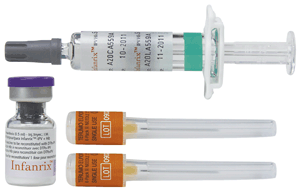The polio vaccine – IPV vaccine
What is polio?
Polio is a serious disease, which is caused by a virus. Polio is still common in many regions of the world. The disease can cause the following complications:
- Meningitis;
- Symptoms Flu;
- Paralysis;
- Death.
Polio virus can be transmitted through drinking water or food, acceptance, infected with a virus. It can also be transmitted from person to person (eg, with a kiss) and fecal-oral contact. This type of exposure most often occurs in unsanitary conditions.
Polio can get sick any person. The virus mainly affects children under five years. Besides, it leads to paralysis, some patients in the following cases:
- If there immunodeficiency;
- Pregnancy;
- After removal of the tonsils;
- After intramuscular injection;
- After resistance training;
- For injuries.
Before 1950, when the polio vaccine had not been developed, This disease affects thousands of children every year. But the use of the polio vaccine resulted in, Now that the disease is very rare in developed countries.
Symptoms of polio include:
- A slight rise in temperature;
- Sore throat;
- Abdominal pain;
- Vomiting;
- Meningitis;
- Paralysis.
Polio neïzleçïm. Treating the symptoms of the disease include the following:
- Antibiotics;
- Taking pain;
- Ventilation to facilitate breathing;
- Exercises;
- Healthy diet.
What is polio vaccine?
The polio vaccine consists of inactivated polio virus. In the past, an oral vaccine, containing live virus polio. Since there is a small risk of getting polio when receiving oral vaccine, Now this type of vaccine is no longer used. The polio vaccine is administered today by injection arm or leg.

Who and when to be vaccinated against polio?
Polio vaccination is recommended for all children. Grafting may be made for children aged 6 weeks. Vaccination is carried out only if there is an increased risk of infection child. Planning vaccine is given at age 2, 4, 6-18 months, and in 4 year. If a child gets a fourth dose at the age of 4 years, it will need a fifth dose 4-6 years.
Adult, who do not have not been vaccinated against polio as a child, You should consult with your doctor about vaccination in the following cases:
- If you plan a trip to the districts, where there is a risk of exposure to polio;
- When working with polio virus in the laboratory;
- Should health care workers be vaccinated, treating patients, who may be ill with polio.
Risks, associated with vaccine against poliomyelitis
Most people have no problems after vaccinations against polio. Nonetheless, It may feel some soreness in the area of the injection site. Like all vaccines, polio vaccine carries a very small risk of serious complications, such as severe allergic reactions.
Sometimes graftable given paracetamol, to reduce pain and fever, which may occur after vaccination. The children paracetamol can lead to a weakening of the effectiveness of the vaccine. It should discuss the risks and benefits, associated with the use of drugs with a doctor.
Who should not be vaccinated against polio?
You should not receive polio vaccine, if:
- Meet allergiya of neomycin, Streptomycin ili polymyxin;
- It had an allergic reaction to a previous dose of the vaccine against polio;
- There is a moderate or severe illness (vaccination should be carried out after recovery).
What are the ways to prevent polio vaccination in addition?
It is necessary to avoid unsanitary conditions and adhere to the rules of personal hygiene (eg, wash hands regularly). This will help prevent polio.
What happens in the event of an outbreak of polio?
In the event of an outbreak all, who have not been vaccinated against polio should be vaccinated.
